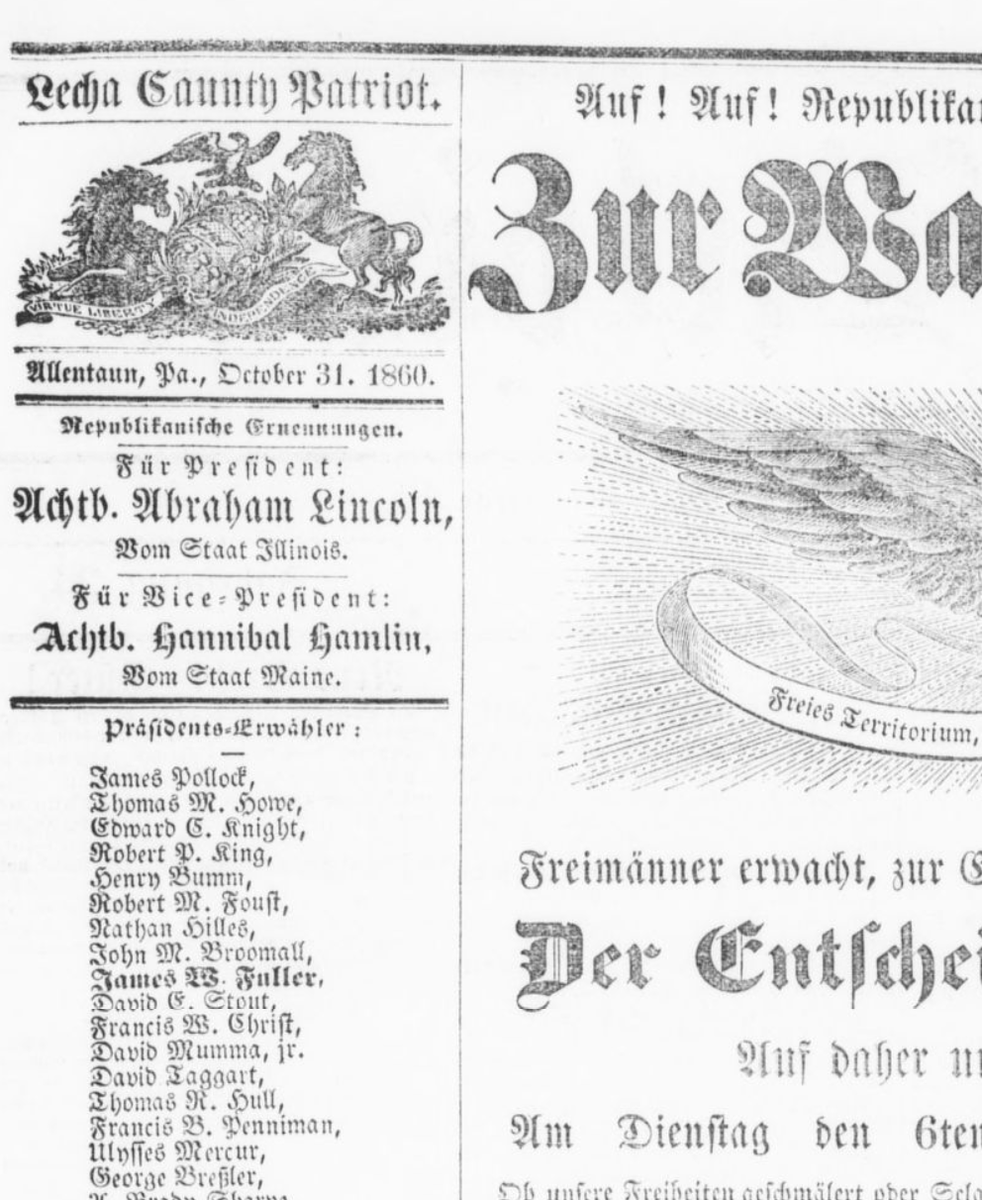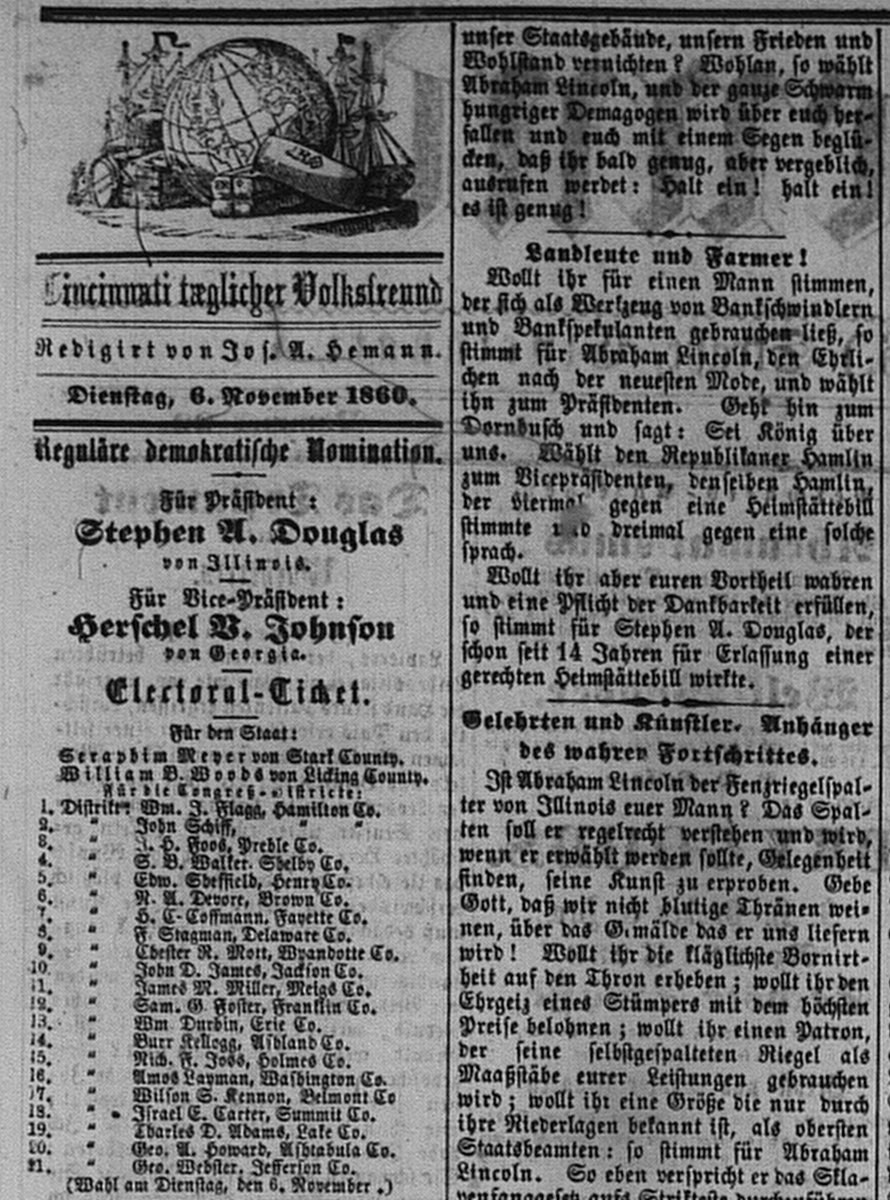The 1850s were fascinating because there were three different political fears - often expressed as conspiracies - that animated North and South. Southern fear of abolitionists, Northern fear of the "Slave Power," and "mostly Northern" fear of foreign Catholics.
Immigration politics led to the collapse of the Whig Party after 1852. The new anti-Kansas/Nebraska Party (named the Republican Party) jockeyed with the secretive Know Nothings (later the American Party) for competition with Democrats in 1854-56.
The wild card element in all of this was the German immigrant population. They came to America already mostly anti-slavery but also, initially, solidly Democratic. The Whigs were mostly anti-immigrant so Germans never felt at home with the Whigs.
Many Germans (esp. Catholics) stayed loyal to the Stephen Douglas wing of the Democratic Party right up through 1860. But the Buchanan-Breckinridge pro-slavery wing was repulsive to them. It was up to local politicos, esp. in the Ohio and Miss. Valleys, to organize Germans.
It was a real balancing act, esp. bc Upper South Whigs (now Americans) rioted against Germans in Louisville in 1855, accusing them of being anti-slavery zealots. So Republicans looked like a good alternative. But other state Republicans (like in PA) were more anti-immigrant.
PA Republicans nominated local pol Simon Cameron in 1860 bc they didn& #39;t want Wm. Seward, who was known for being friendly toward Catholics. Lincoln was strategically silent on immigration and so was acceptable to PA Repubs on the second ballot.
What I wonder is how the old school Pennsylvania German (PA "Dutch" who immigrated in the 18th century) community thought of the recently arriving German immigrants. PA Dutch in Berks County were some of the most militantly Dem voters in America.
Newer German immigrants voted Dem in the 1840s. But by 1860, some of the PA German language newspapers backed Lincoln, much like what was happening in STL, Cincy, Evansville, etc. Anyway, it& #39;s one of those fascinating permutations between 1854 and 1860 on the road to Civil War.
Here& #39;s the Lehigh (Lecha) County Patriot, a German language newspaper supporting Lincoln
And here& #39;s a pro-Douglas Democratic paper from Cincinnati - the Taglicher Volksfreund.
One of the lessons of the 1850s is to not look at history as purely linear, as if a series of actions inexorably lead to the "next event" in time. There were so many contingent events in the 1850s - Panic of 1857, Know Nothing movement, Bleeding Kansas, etc. - no straight line.
To add to this, coming of the US Civil War happened in an international context where European autocrats consolidated rule after the failed 1848 revolutions but national unification efforts continued anyway. Also, emerging from famine in the 1840s & mass-scale industrialization.
So these German migrants to America were, on one hand, part of a 200-year long chain of migration to America, from the 1680s to the 1880s. But also in an acute moment of political and economic change that uprooted so many skilled craftsmen losing jobs to industrialization.
Add to them a recently liberated peasantry booted off the land by money-hungry Junkers (large landowners) and it becomes clear why so many of these migrants loathed the aristocratic pretensions of American slaveholders.
They were Lutherans, Catholics, Freethinkers and Jews. In Europe they likely never interacted. But in crowded neighborhoods like Cincinnati& #39;s Over-the-Rhine, they forged a German American identity based on a philosophy of mutual aid, self-improvement and anti-slavery.
At the same time German Americans participated in the US Civil War and Reconstruction, Germany experienced its own nation-building project: Bismarck& #39;s Blood and Iron campaigns against Denmark (1864), Austria (1866) and France (1870-71).
But wait, there& #39;s more! Same decade-plus saw the French occupation of Mexico (and installation of Emperor Maximillian), Canada& #39;s Confederation, South America& #39;s horrid Paraguayan War, China& #39;s Taiping Rebellion, Italy& #39;s unification, India& #39;s 1857 Mutiny, Russian serf emancipation.
And with completion of the Trans-Atlantic telegraph cable, news of many of these events traveled in minutes, rather than weeks or months. The technological change was dizzying. Oh, and Darwin& #39;s On the Origin of Species came out in 1859, just to shake things up...

 Read on Twitter
Read on Twitter



